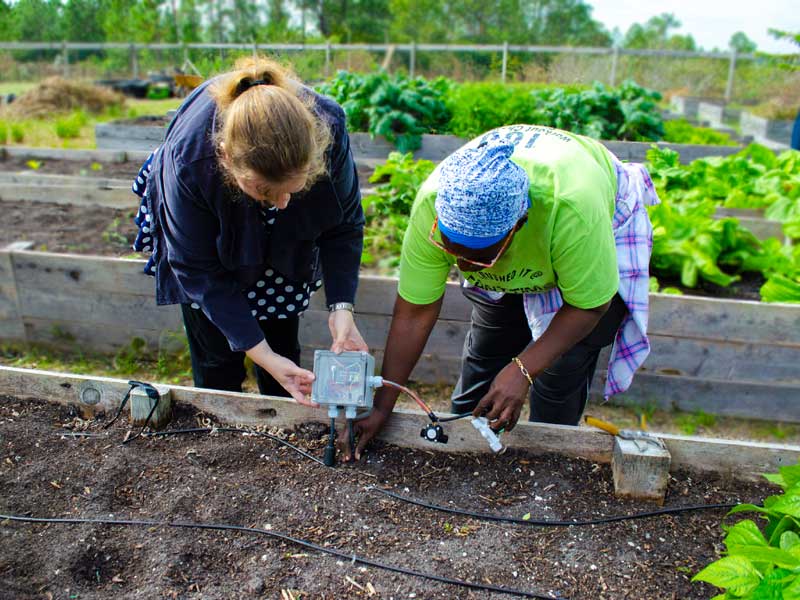by J.P. SMITH
In the heart of Florida, through the pulsing strip of the the High-Tech Corridor, is the renowned STEM college, Florida Polytechnic University. It is the home of the award winning and one of the 16 “Most Breathtaking” Buildings, the iconic Innovation, Science and Technology (IST) Building. The unique location of FL Poly in Lakeland, FL has provided them with the available green space and a rare opportunity to integrate technology with agriculture in the Smart Garden. Organically, the idea of building an integrative and immersive Intelligent Garden was born during summer 2017. It’s purpose would utilize, create, and integrate key technology for use from the digital world to benefit the physical world of agriculture.
The growing population of earth’s inhabitants presents a unique problem in food sources, as well as, renewable and sustainable energy and resources. People will always need food, and we will always need to understand the ever-changing world around us in which to grow the food. The Associate Professor of Physics, Dr. Nicoleta Sorloaica-Hickman, assembled a team to achieve this integration of technology with agriculture.
Specializing in medical robotics, Dr. Melissa Morris, Assistant Professor of Mechanical Engineering, was brought on board and officially became Project Director to the gardens in August 2018. Morris experience brings an interesting creative opportunity for the future of agriculture. Part of her responsibilities is mentoring and assisting students “implementing technology” in the gardens. Morris states that the goal of the Intelligent Garden is, “to further research in sustainability and technology in agriculture and horticulture” including the important goal, “to feed others and promote the technology to the community.”
The journey of intelligent gardening through the smart garden phases:
Phase I: Fully Built and Operational – “if you build it – it will grow”
Essentially, the main hurdle was achieved. Build a green garden, get it planted, functioning, and producing. This, of course, required the caretaking from an experienced, knowledgeable, Florida farmer or gardener. That’s where Ms. Beverly Butler, a Master Gardener, became part of the Renewable Energy and Sustainability Research Team, as the Intelligent Garden Coordinator in July 2017. The photovoltaic (solar) powered system and the smart watering system was implemented. Only the water needed would be used, and differentiates according to the weather and each bed’s needs. Butler, renowned for her organic gardening, oversees 30, 4×16 raised beds as well as seeding and bio waste areas.
Phase II: Current Phase and Growth Plans
As the shift continues into the current Phase II, the smart water technology and sensors perform their tasks of reading and communicating their collected data back to the labs in the IST building. Mr. Grant Percy, a current student of Florida Poly and a research assistant under Hickman, began his duties this summer assisting in the designing and prototyping the Smart Garden system. He works with the microcontrollers interaction of reading, sensing, and controlling all the sensors among his other duties of tracking water usage, gathering measurements, testing soil moisture, and exporting that data from the digital to the physical world. He’s able to command and communicate to the garden through the sensors.
Phase III: Continuing Utilization
There are hopes for building hydroponic garden systems inside the IST for use in experiments before it’s established in the gardens. Problems to overcome through experimentation would be, Florida’s high heat index, humidity, algae growth, and water-borne issues. Then from those results this phase will hopefully experience the full-scale employment of hydroponic and aeroponic systems.
Phase IV – Growing Forward – The Future
Fully automated agricultural technology is the goal for the intelligent garden. Robotic devices would be able to perform numerous gardening activities, such as weeding, fertilizing, pruning, transplanting, harvesting, with minimal human intervention. Such aids have the potential to answer needs of labor shortages in agriculture, gaps in care for farming, and accurate real-time farming and gardening needs.
The challenges of technology in automation and robotics for the intelligent garden includes its initial cost and the long but steady process, which requires detailed steps to develop and achieve it. The fully automated robotic intelligent garden or farming is not a place we will just simply arrive at.
Since the population of the world will always require food, it’s a living goal that will always need to grow, adapt, modify and incorporate the function and use of technology with agriculture, the immersion of the digital world with the physical world. As with any project, it requires funding and the support of the community.
“Technology, Research, Agriculture, Community, all make the square perfect,” explains Butler. Each one builds on the other. If we lose one, we lose the holistic integrative benefit of them all together.
With a team consisting of scientists and people, such as Hickman, Morris, Butler, and students like Percy, Florida Poly will continue to find innovative ways to reduce fatigue on humans, discover farming practices that increase safety and ergonomics, and an entirely scalable program that benefits farmers, small gardeners and consumers, and the renewable and sustainable energy and resources in agriculture.
For more information, visit floridapoly.edu.

